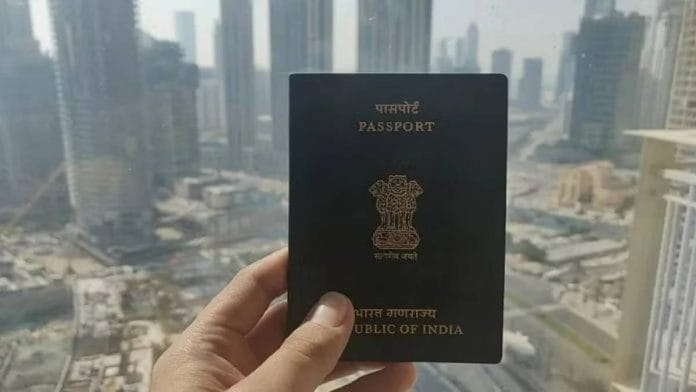New Delhi: The Indian passport has fallen five positions from 80 to 85 in the list of the world’s most powerful passports, published bi-annually by Henley and Partners. The Henley Passport Index for 2025 was published Wednesday.
According to the latest rankings of the Henley Passport Index, an Indian passport holder has visa-free access to 57 countries across the world. This is the lowest number of countries with visa free access for Indians since 2017, when an Indian citizen could travel to only 49 countries without requiring a visa. In 2024, Indians could travel to 62 countries without requiring a visa.
This is also India’s lowest ranking in the Passport Index since 2021, when its passport was ranked the 90th most powerful in the world, with visa-free access to 58 countries. Since then, the Indian passport has gone up the list, peaking at 80 last year, before falling to its current position of 85 for 2025.
Passports of 155 countries have greater visa-free access to travel the world than the Indian passport in 2025. India shares its spot with Equatorial Guinea, the Central African country on the West coast of the continent, and Niger, the Central African nation, both of which also have visa-free access to 57 countries.
The Henley Passport Index includes 199 passports across 227 destinations, with historical data spanning almost two decades. It includes data collected exclusively from the International Air Transport Association (IATA).
The Pakistani passport fares even more poorly than India’s, being ranked as the 103rd most powerful travelling document in the world, with visa-free access to 33 countries. Islamabad shares its spot with the West Asian country of Yemen—which has been gripped in a civil war since 2014.
Also read: Is brand India dimming? Pollution panic, dire warnings for women, big dip in foreign tourists
Singapore—the most powerful passport in the world
Singapore retains its top spot from 2024, with its passport holders able to travel to 195 countries without a need for visas out of 227 destinations, while Japan has the second-most powerful passport in the world, with visa-free access to 193 destinations.
France, Germany and Italy, three countries, which joined Singapore in 2024 as the most powerful passport in the world have all fallen to the third spot, with visa-free access to 192 countries. Finland, South Korea and Spain, join the three European Union (EU) countries in the third position this year.
Austria, Denmark, Ireland, Luxembourg, Netherlands and Sweden, all members of the EU have the fourth-most powerful passport in the world with visa-free access to 191 countries, along with the Scandinavian country of Norway.
The UK, which at one time had one of the most powerful passports, has fallen to fifth position with visa-free access to 190 destinations, rounding out the top 20 powerful passports in the world.
Except for Singapore, Japan, South Korea and New Zealand, the 20 countries with the most powerful passports are all from the European continent, with most being members of the EU, apart from Norway, Switzerland and the UK.
The US and the UK have been two major powers to see their passport decline in its power, with an American passport falling seven places from 2nd to 9th in the last decade. A US passport today allows visa-free access to 186 countries.
In contrast the Chinese passport grew 34 places in the last decade, now offering visa-free access to 40 more countries than it did in 2015. A Chinese passport is the 60th most powerful in the world in 2025 with visa-free access to 85 nations.
“Even before the advent of a second Trump presidency, American political trends had become notably inward-looking and isolationist. Even though US economic health relies heavily on immigration, tourism, and trade, voters during the 2024 presidential campaign were fed a narrative that America can (and should) stand alone,” said Annie Pforzheimer, Senior Associate at Washington thinktank the Center for Strategic and International Studies, in a press release published by Henley and Partners.
“Ultimately, if tariffs and deportations are the Trump administration’s default policy tools, not only will the US continue to decline on the mobility index on a comparative basis, but it will probably do so in absolute terms as well. This trend in tandem with China’s greater openness will likely give rise to Asia’s greater soft power dominance worldwide,” added Pforzheimer.
How does India’s neighbourhood fare?
The Maldivian passport is the most powerful among the countries in South Asia, with visa-free access to 94 countries, and ranking 53rd in the Henley Passport Index. Nepal, the Himalayan country neighbouring India, has visa-free access to 39 countries, ranking 101 on the passport index.
Bangladesh is one spot above Nepal, with visa free access to 40 countries, while Bhutan’s passport has access without requiring a visa to 52 countries. A Sri Lankan has visa free access to 44 countries, along with Iran and South Sudan, while a Myanmar passport holder has access to 46 destinations, being ranked at 94 in Passport Index.
Visa applicants from Pakistan, Bangladesh and Syria have some of the highest rejection rates for Schengen visas, according to Henley and Partners. However, the countries with top rejection for the visa to travel across EU countries and certain countries from the European Free Trade Association (EFTA) all come from Africa—Comoros, Guinea-Bissau, Ghana, Mali, Sudan and Senegal.
Also read: Fewer tourists are visiting India now. What’s worse, our stand is we don’t really care






